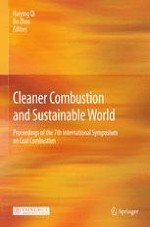2013 | OriginalPaper | Chapter
CO2 Capture Performance Using Limestone Modified with Propionate Acid During Calcium Looping Cycle
Authors : Sun Rongyue, Li Yingjie, Liu Hongling, Wu Shuimu, Lu Chunmei
Published in: Cleaner Combustion and Sustainable World
Publisher: Springer Berlin Heidelberg
Activate our intelligent search to find suitable subject content or patents.
Select sections of text to find matching patents with Artificial Intelligence. powered by
Select sections of text to find additional relevant content using AI-assisted search. powered by
